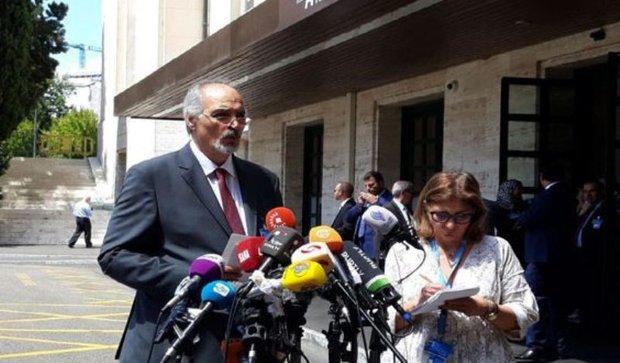Following the session, al-Jaafari said in a press statement that this round of talks, which he described as “useful”, focused on two main issues, that are combating terrorism and the meetings of legal and constitutional experts.
He added that the technical experts’ talks dealt with the principles related to the constitutional process included in the “basic principles for the political solution paper, which he called the “12-point paper”.
“We talked about combating terrorism during three sessions with the Special Envoy and his team, and the closing session today was mostly dedicated to discussing counterterrorism, and we explained to the Special Envoy and his team the latest developments related to the fight against terrorism on Syrian soil and we urged him to get more involved in passing our concerns on the issue of terrorism and fighting terrorism to the Security Council and the international community,” said al-Jaafari.
He noted that the exchange of views about combating terrorism was “useful” and detailed and “in this context, we drew the Special Envoy’s attention, and I draw your attention as responsible journalists to the massacres caused by the operations of the so-called ‘international coalition’ around Raqqa city and in al-Tabqa, which are operations, as you know, have led to the drastic deterioration of the humanitarian situation, and when I speak about the deterioration of the humanitarian situation, I mean of course that of the civilians.”
“We add to that also the Turkish expansionist intentions in northwestern Syria,” al-Jaafari said, referring also to the indiscriminate bombardment operations carried out by the forces of the international coalition in northern Syria, Raqqa and al-Tabqa.
On the other hand, he said, there is an optimistic picture; that is of the return of hundreds of internally displaced Syrian families in the city of Jarabulus on the border with Turkey to their homes in al-Waer neighborhood in Homs, in addition to the return of hundreds of other families from Arsal in Lebanon on the Syrian border to Assal al-Ward city in Syria.
In response to a question about the results of the detailed talk on counterterrorism during this round, al-Jaafari clarified that the extent to which the talk about this issue was taken seriously will be seen today in de Mistura’s press statements later today and in his update to the Security Council.
“This is exactly what we asked the Special Envoy for, which is to transfer the counterterrorism issue seriously from the theoretical discussion in closed-door rooms to the international public opinion and the Security Council,” he said.
Al-Jaafari mentioned a “little scandal” that happened in the UN Security Council about a team at the UNSC called the Analytical Support and Sanctions Monitoring Team that works on enforcing the UNSC resolutions no.2253 and no.1267 which are related to combating terrorism.
Al-Jaafari pointed out that for years, Syria have been inviting this particular team to visit Syria in order to provide it with very important information on the activities of ISIL, Jabhat al-Nusra and other terrorist groups in Syria, and after a long procrastination on the team’s part, the team had finally agreed to visit Syria and the Syrian side prepared everything to make the visit possible and set a date for it, but only hours before the date for travel, the team called al-Jaafari’s office in New York saying they can’t travel because their budget was USD 400 short.
He went on to say that the team seems to not even have USD 400 to fight ISIL and Jabhat al-Nusra, but actually the salaries of this team will add up to one million dollar.
In his reply to a question on the return of Syrian refugees, al-Jaafari said “You all know that the Syrian government has called on the countries that hosted yrian refugees to allow them to return to their homeland. Several times we have made public calls by the Syrian government to countries hosting Syrian refugees. But the main problem is that these governments deal with the issue of Syrian refugees in terms of political and financial investment.”
Asked whether the meetings with de Mistura dealt with the US coalition’s attacks on the Syrian Arab Army in al-Badia as well as the Israeli attacks in Quneitra, al-Jaafari said “yes, we spoke in detail.”
Answering a question about whether there is a change in the international climate after the Hamburg Summit and his assessment of the statements made by the French president, who said that his country has changed its political doctrine towards Syria, al-Jaafari said Syria welcomes any awakening in any Western capital and that any return to seriously fighting terrorism along with the Syrian army and the Syrian government from any capital is also welcomed.
“We have provided enough explanations to Mistura about our vision of the subject of direct talks, and the most important thing is to have a national partner for us,” al-Jaafari said in response to a question about getting closer to starting direct talks with the “opposition”.
In the same context, de Mistura said that he will present to the UN Security Council today’s evening a report on the outcomes of the seventh round of the Syrian-Syrian dialogue in Geneva.
He added that more meetings will be held this afternoon, and that in the evening, he will contact with the UN Security Council at 9:00 am (Geneva time).
SANA/MNA

























Your Comment